 I’m not completely sure what this post has to do with happiness or intentionality, except that unexpected connections can be a source of pleasure. So this shot was taken on our hike last week, the one that was supposed to have us end up at Blue Lake but which ended considerably before that because there was so much snow still on the trail.
I’m not completely sure what this post has to do with happiness or intentionality, except that unexpected connections can be a source of pleasure. So this shot was taken on our hike last week, the one that was supposed to have us end up at Blue Lake but which ended considerably before that because there was so much snow still on the trail.
Books
So What Am I Going to Eat?
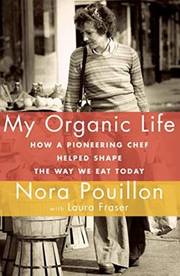 Well, I had a very spiritual book picked out for this week, and I definitely plan to write about it soon. But . . . have you heard the saying “When the student is ready, the teacher appears”? (I think that’s a koan, but I’m not sure.) So there I was at the library a few days ago, looking at the new books display at the top of the stairs as I always do, and here was this one. I love books about chefs. (Although I found Blood, Bones and Butter to be supremely put-down-able.) The organic part doesn’t interest me all that much, I’m not too sorry to say, but I was intrigued by the author because we used to live right outside Washington D.C. and I’d heard of her restaurant there. Not that we ever went–it’s pretty pricey. But I thought it might be fun to read at least some of it. Well, I was hooked right away. It says that she has a “with” author, so I guess Nora herself can’t take all the credit for the beautiful vivid writing, but it’s really a great read.
Well, I had a very spiritual book picked out for this week, and I definitely plan to write about it soon. But . . . have you heard the saying “When the student is ready, the teacher appears”? (I think that’s a koan, but I’m not sure.) So there I was at the library a few days ago, looking at the new books display at the top of the stairs as I always do, and here was this one. I love books about chefs. (Although I found Blood, Bones and Butter to be supremely put-down-able.) The organic part doesn’t interest me all that much, I’m not too sorry to say, but I was intrigued by the author because we used to live right outside Washington D.C. and I’d heard of her restaurant there. Not that we ever went–it’s pretty pricey. But I thought it might be fun to read at least some of it. Well, I was hooked right away. It says that she has a “with” author, so I guess Nora herself can’t take all the credit for the beautiful vivid writing, but it’s really a great read.
An Outsider’s View of the Bible
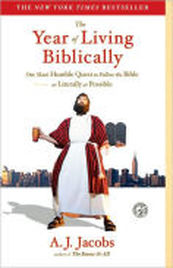 The Year of Living Biblically by A. J. Jacobs, original hardback published in 2007 by Simon & Schuster, now available in a number of formats and sources, all of which are listed on A. J. Jacobs’ website. You may also listen to Jacobs’ TED talk on the subject of his Biblical year and read an interview of Jacobs in Christianity Today.
The Year of Living Biblically by A. J. Jacobs, original hardback published in 2007 by Simon & Schuster, now available in a number of formats and sources, all of which are listed on A. J. Jacobs’ website. You may also listen to Jacobs’ TED talk on the subject of his Biblical year and read an interview of Jacobs in Christianity Today.
Well! If you look up all of the information I provide above you (almost) won’t need to read this post. But I hope you will, and then will go on and read the book. I had read it quite some time ago, probably around its publication, and had been struck with its essential sweetness, kindness and fairness.
An Affecting but Erudite Memoir
 In a Dark Wood: What Dante Taught Me About Grief, Healing, and the Mysteries of Love by Joseph Luzzi, HarperCollins, 2015.
In a Dark Wood: What Dante Taught Me About Grief, Healing, and the Mysteries of Love by Joseph Luzzi, HarperCollins, 2015.
Joseph Luzzi had just started teaching his mid-morning class at Bard College in November 2007 when he saw a security guard standing at his door. “Are you Professor Luzzi? Please come with me.” As Luzzi reached the outside of the building, he heard the words that would forever change his world: “Joe, your wife’s had a terrible accident.”
Are Good Deeds Their Own Reward?
 I wrote last week about John Piper’s book Desiring God and said that I had just started reading it and was excited about its ideas. I’ve been chewing over it–a better description than “reading it”–and realizing more and more how much it would have helped me back when I was a college student and struggling with the question of what God wanted me to do with my life. But hey–I’m still struggling with that question. So it’s still helpful.
I wrote last week about John Piper’s book Desiring God and said that I had just started reading it and was excited about its ideas. I’ve been chewing over it–a better description than “reading it”–and realizing more and more how much it would have helped me back when I was a college student and struggling with the question of what God wanted me to do with my life. But hey–I’m still struggling with that question. So it’s still helpful.
Is It Sinful to Be Unhappy?
 Desiring God: Meditations of a Christian Hedonist, rev. ed., by John Piper, Multnomah Press, 2011. Available in other formats and earlier editions.
Desiring God: Meditations of a Christian Hedonist, rev. ed., by John Piper, Multnomah Press, 2011. Available in other formats and earlier editions.
We were privileged to attend Capitol Hill Baptist Church in downtown Washington D.C. for the first decade of the new millennium. At some point early on in our time there the phrase “Christian hedonist” was booted about, as was the name of John Piper. I’d never heard of either. Then we had Piper as the preacher for a Sunday morning service; all I remember personally from that sermon is that he was so soft-spoken I could hardly hear him. Bookmarks with Piper’s ideas on “How Shall We Fight for Joy?” were passed out. To someone from my background this whole emphasis on Christians’ being happy was kind of weird. (I hadn’t read The Happiness Project yet, since it wasn’t yet on the scene, so I wasn’t thinking in that ballpark at all, in any context.
A First-Person Account of a Dreadful Disease
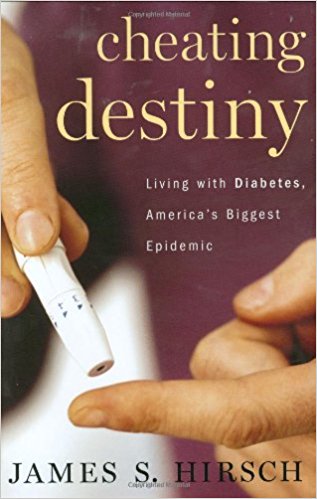 Cheating Destiny: Living with Diabetes, America’s Biggest Epidemic by James S. Hirsch, Houghton Mifflin Company, 2006.
Cheating Destiny: Living with Diabetes, America’s Biggest Epidemic by James S. Hirsch, Houghton Mifflin Company, 2006.
I had been reminded of this book when I got some rather unsettling news about my blood sugar back at the beginning of this year, but I couldn’t remember the title and my Google searches under “diabetes memoir” were unsuccessful. As I’ve been consciously monitoring my blood sugar levels over the past few weeks I’ve been reminded of it again, and for some reason this time I was able to track it down. Hirsch is a journalist and author. He is also a type 1 diabetic and already had been planning to write a book about the disease when his 3-year-old son was diagnosed with the same condition. (Or disease. There’s some controversy as to what label diabetes should have.)
Fear More, Worry Less
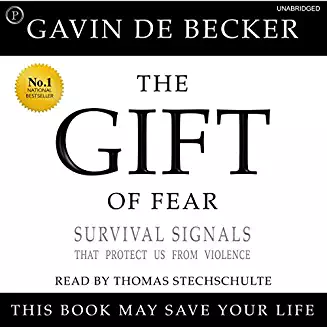 The Gift of Fear and Other Survival Signals that Protect Us from Violence by Gavin de Becker, Dell Trade Paperback, 1999, also available in other formats. I’m not sure why I was reminded of this book and put it on hold at the library. I had read it before and remembered portions of it quite well, but it was well worth re-reading. De Becker runs a security firm, providing services and counseling to people who feel and/or indeed are under threat. He himself grew up in an extremely violent home, but instead of becoming violent himself he decided to help reduce violence by giving people the tools they need to protect themselves.
The Gift of Fear and Other Survival Signals that Protect Us from Violence by Gavin de Becker, Dell Trade Paperback, 1999, also available in other formats. I’m not sure why I was reminded of this book and put it on hold at the library. I had read it before and remembered portions of it quite well, but it was well worth re-reading. De Becker runs a security firm, providing services and counseling to people who feel and/or indeed are under threat. He himself grew up in an extremely violent home, but instead of becoming violent himself he decided to help reduce violence by giving people the tools they need to protect themselves.Why do we care what other people think?
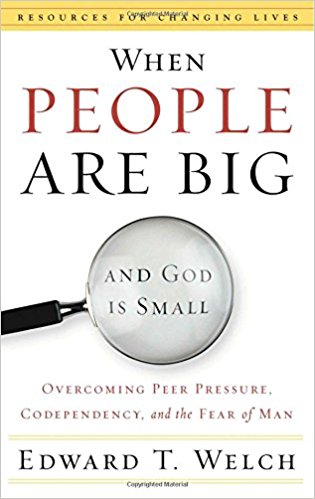 When People are Big and God Is Small: Overcoming Peer Pressure, Codependency, and the Fear of Man by Edward T. Welch, P & R Publishing, 1997. Published in cooperation with The Christian Counseling and Education Foundation.
When People are Big and God Is Small: Overcoming Peer Pressure, Codependency, and the Fear of Man by Edward T. Welch, P & R Publishing, 1997. Published in cooperation with The Christian Counseling and Education Foundation.
This past Sunday, during an excellent sermon drawn from the book of Romans, my pastor cited a term that was new to me: “imposter syndrome.” According to an article in Forbes magazine and other sources, this condition occurs when seemingly confident and capable people are plagued by the fear of being exposed as frauds. “Everyone thinks I’m so great. If they only knew!”
Sounds pretty normal to me! And very biblical, to boot. The Christian view of man says that we’re all incapable of saving ourselves and in desperate need of someone else to do it for us. and that someone is Christ. Our sinful nature explains why we’re so messed up when it comes to our reactions to both the accolades and the taunts of other people. We fear them more than we fear God. As I listened to the sermon I was reminded of this book and decided to use it for this week’s post.
A Happy Perspective on Food
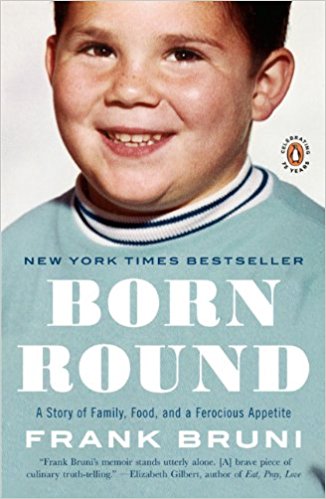 Just finished a fascinating book mostly about food and our relationship to it. Frank Bruni, who was the restaurant critic for the New York Times from 2004-2009, spent most of his life battling his weight. He grew up in an Italian-American family that put great emphasis on having mounds of food available at any and all times. If there wasn’t enough food on the table to make it sag, then there wasn’t enough. As Bruni moved into young adulthood he tried amphetamines, forced vomiting, and other extremely unhealthy measures to control his weight. After college he became a journalist, and at one point he was following George W. Bush on his campaign trail. He calculated that there were eight meals served daily to the press corps in an effort to keep them (literally) fat and happy so that they’d report positively on the candidate.
Just finished a fascinating book mostly about food and our relationship to it. Frank Bruni, who was the restaurant critic for the New York Times from 2004-2009, spent most of his life battling his weight. He grew up in an Italian-American family that put great emphasis on having mounds of food available at any and all times. If there wasn’t enough food on the table to make it sag, then there wasn’t enough. As Bruni moved into young adulthood he tried amphetamines, forced vomiting, and other extremely unhealthy measures to control his weight. After college he became a journalist, and at one point he was following George W. Bush on his campaign trail. He calculated that there were eight meals served daily to the press corps in an effort to keep them (literally) fat and happy so that they’d report positively on the candidate.